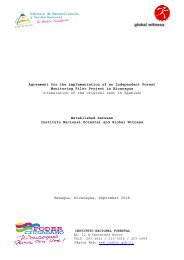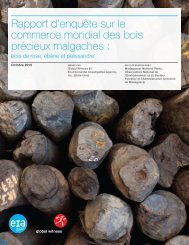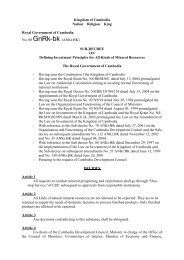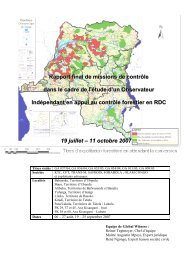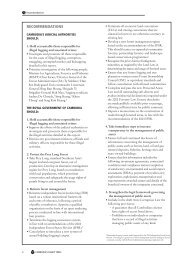03sep3 Conflict of Interests 60-89.pdf - Global Witness
03sep3 Conflict of Interests 60-89.pdf - Global Witness
03sep3 Conflict of Interests 60-89.pdf - Global Witness
You also want an ePaper? Increase the reach of your titles
YUMPU automatically turns print PDFs into web optimized ePapers that Google loves.
83<br />
Part Two: Logging in Burma / 19 The China-Burma Border<br />
19.3 The impact <strong>of</strong> logging in China<br />
“Protection <strong>of</strong> natural forests is pressing work, and by<br />
delaying efforts by even one day, our losses will add up by<br />
one inch, and our Yellow and Yangtze rivers will not give<br />
us peaceful days.” 314 Zhu Rongji, Chinese Premier, 1999<br />
The development strategy <strong>of</strong> post revolution China had a<br />
serious impact on China’s environment, particularly its<br />
forests. Forest cover fell from 21% in 1949 to only 14%<br />
in 2003. However, it is now on the increase, as China<br />
makes efforts to reverse the deforestation <strong>of</strong> the past<br />
with extensive afforestation programmes, mainly<br />
through plantations. Afforestation and territory greening<br />
have been defined as a “common duty <strong>of</strong> society.”<br />
In 1996 and 1997 floods cost Yunnan 3.2 billion<br />
yuan ($402,500,000) and 4.5 billion yuan ($542,170,000)<br />
respectively. 315 Severe flooding on the Yangtze River in<br />
1998 affected one-fifth <strong>of</strong> China’s population in 29<br />
provinces, killing more than 3,<strong>60</strong>0 people and<br />
destroying about 5 million hectares <strong>of</strong> crops. Economic<br />
losses throughout China were estimated at over $36<br />
billion. 316 Soil erosion caused by logging in the<br />
watershed <strong>of</strong> the Jinshajiang River, which flows through<br />
north eastern Yunnan and western Sichuan, led to the<br />
river depositing 280 million tons <strong>of</strong> sediment into the<br />
Yangtze every year. 315 This was found to be a major<br />
contributory factor to the flooding. 317 These floods<br />
prompted China to recognise the importance <strong>of</strong><br />
protecting its remaining natural forests, leading to the<br />
introduction <strong>of</strong> a nationwide logging ban in 1998.<br />
Yunnan also suffers from mudslides that kill<br />
hundreds <strong>of</strong> people each year. In Yingjiang County<br />
opposite Kachin State, in August 2000, a mudslide<br />
destroyed a hydroelectric power station with 45 people<br />
inside, killing at least 14 people. 318 The damage was<br />
estimated at $2.4 million. 319 A similar event is reported<br />
to have happened in Kachin State recently with a KIO<br />
hydropower project. 344<br />
Chinese slogan pillar, on the road from Luzhan to Pian Ma, China; 2001. Translation:<br />
“Protecting the Gaoligonng Mountains is protecting our own garden; Protecting the forestry resource is<br />
glorious: Damaging the ecological balance is shameful; Protecting the forest and maintaining ecology is an<br />
achievement in the present era: Pr<strong>of</strong>it in centuries; To set fire to the mountain forests, to poach, to steal and cut<br />
trees and deforest is strictly prohibited.” Propogated by the peoples government and the administrative bureau<br />
<strong>of</strong> the nature reserve <strong>of</strong> Lushui county.<br />
A CONFLICT OF INTERESTS<br />
IMPORTS OF TIMBER INTO CHINA<br />
FROM ALL COUNTRIES AND OF ALL<br />
CATEGORIES SOURCE: CHINESE CUSTOMS DATA<br />
Millions <strong>of</strong><br />
cubic metres<br />
25<br />
20<br />
15<br />
10<br />
5<br />
0<br />
1990 1992 1994 1996 1998 2000 2002<br />
19.4 The impact <strong>of</strong> China’s logging ban<br />
“Logging in China is forbidden, it is a very serious <strong>of</strong>fence,<br />
even to cut a small tree ... If you look around Tengchong,<br />
you can see that they are planting trees everywhere.” Anon<br />
KIO <strong>of</strong>ficer, 2002.<br />
Before the logging ban, Beijing had ordered some<br />
counties in Yunnan to stop logging, in part due to the<br />
fear <strong>of</strong> further mudslides. Following the 1996 logging<br />
ban in Yunnan major forest enterprises decreased their<br />
output by two thirds. But despite the ban smaller<br />
enterprises continued logging, taking the view that<br />
“The sky is high, and the emperor is far away.”<br />
In 1998 China imposed a country wide logging ban<br />
on natural forests in specified regions <strong>of</strong> 18 provinces,<br />
approximately two-thirds <strong>of</strong> the country. China<br />
recognised that the deterioration <strong>of</strong> the ecological<br />
environment in major watersheds had become a limiting<br />
factor for its continued economic development. 310 Soon<br />
after the imposition <strong>of</strong> the ban on a visit to Yunnan the<br />
Chinese Premier, Zhu Rongji, said that the “protection<br />
<strong>of</strong> forests should be viewed from the vantage <strong>of</strong> the<br />
entire nation’s economic and social development, and<br />
from the height as something that concerns the Chinese<br />
people’s long-term development.” 320<br />
The Chinese authorities are making<br />
every effort to enforce their own logging ban.<br />
In Yunnan in 1999 “forest police handled<br />
over 10,000 cases related to poaching wild<br />
animals and destroying forest resources. And<br />
16, 000 people were dealt with according to<br />
the law;” 321 or as one Chinese <strong>of</strong>ficial,<br />
referring to the dismissal <strong>of</strong> bureaucrats<br />
caught permitting logging in Yunnan, put it<br />
“the felling <strong>of</strong> one tree now costs one head to<br />
roll.” 315 But this is ultimately at the expense<br />
<strong>of</strong> other timber producing countries as<br />
diverse as Indonesia and Liberia, and in the<br />
case <strong>of</strong> China’s near neighbours concern for<br />
the environment appears to end at the border.<br />
This ban is part <strong>of</strong> the “Natural Forest<br />
Conservation Programme” (NFCP) that,<br />
amongst other things, aims to reduce log<br />
extraction in natural forests in China from





